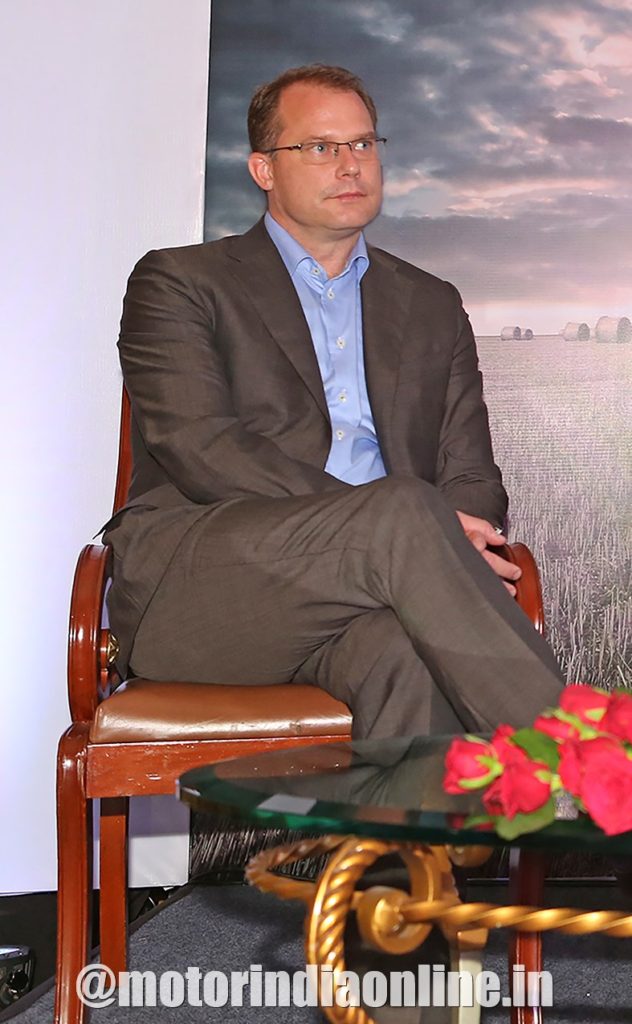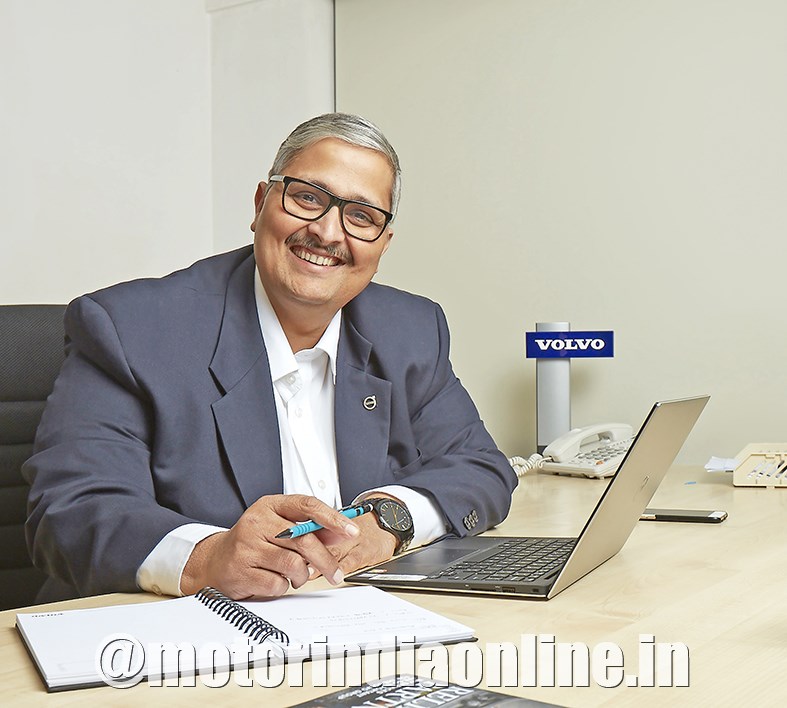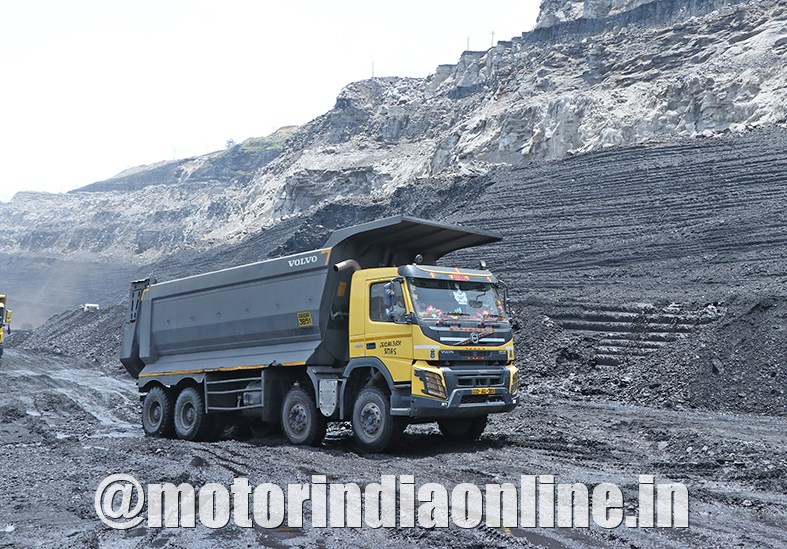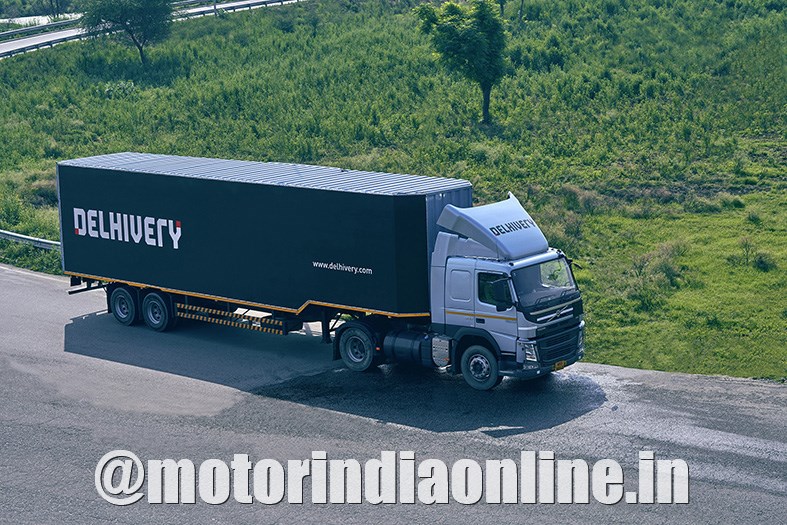N. Balasubramanian seeks international and domestic scenarios from Volvo Truck Corporation honchos – Jonas Nilsson, Vice President – Hub India, Volvo Trucks International and Dinakar B, Senior Vice President – Sales, Marketing & Aftermarket, Volvo Trucks India – VECV Ltd., respectively, to understand how the popular truck brand remains optimistic despite challenges posed by the COVID pandemic and its anticipation of a vibrant future post the pandemic.

What, in both your views, is the current situation globally and in the Indian context with regards to the CV sector and from the perspective of Volvo Trucks?
Jonas Nilsson: When a crisis like this strikes globally, the whole organization will be affected and in turn, we would be too and a pandemic such as this is unprecedented. So, it is been challenging times for our colleagues, employees, our customers and the company, but being a global company, we are well equipped and ready to deal with the situation. We believe that we will come out of this stronger.
Dinakar B: In this pandemic, the value chain is getting affected. Though it is better now. The total industry volume had slightly come down compared to 2018-19. However, the transition of BS 4 to 6 also had some impact on our sales. And then we had planned in such a way that the production could meet the requirement before the yearly closing on March 31. Unfortunately, the COVID effect started from early March itself. But we could take care of our stocks as far as BS 4 is concerned, we sold almost all the trucks in the stock much before closure in March. One uptick during the COVID times is that our coal business has been going well because of the fact that it comes under essential commodities where the coal excavation is required. About 90% of our trucks are working in coal sites. The coal sites are working depending on the availability of the manpower and we were able to offer our services to our customers.
There are some changes announced in the coal block allocations by the government. How do you view the next few months? Do you see more activity which is relevant to Volvo Trucks in India? Do you see some traction in the market?
Dinakar: We supply trucks for the coal ore but in removal through private companies which are all project-based requirements. So, the project continuation is based on the coal requirement by the thermal power stations. About 85-90% of our business in coal mining is either earth removal above the coal seam or the infrastructure projects, besides the coal transport for which also we are supplying. Though, there is a consistent requirement of coal in India, last year the requirement had dropped slightly and the coal production was slightly lower than what was produced by Coal India Limited albeit it was only nominal. These are the three major segments where we are present. Then, we are also present in ODC movement. Last year, we had launched our long-haul tractor – 4×2 tractor in long haul express cargo. So, that is one more segment we have opened up for Volvo.
There are some requirements that may come up in various projects, including the coal OB which, I feel, will throw up traction in the next few months. We are already talking to some customers who may take new vehicles for their existing projects.
Nilsson: We are in some favourable segments. Given the circumstances with lockdown, we have been comparatively better off than others due to the customers who have been successful in maintaining and operating mines despite the challenges. I would like to congratulate them and our aftermarket division for serving the customers in these difficult times. We also thank the Karnataka state government, which has allowed us to be partially operational during this time, as part of the essential services categorization because the nation needs power ultimately. And everyone involved has contributed in making that happen.
Dinakar: Regarding infrastructure, the government has many announcements to make and some have already come like the NHAI jobs. The way we see it for our company, whichever segment has high productivity requirement, our trucks will be working in those. We hope to see good traction for our trucks, though as of now we are still in the nascent stages of introducing our trucks into infrastructure and irrigation segments.
Nilsson, how would you say the pandemic has affected your business plans for the current year in the Indian market?
Nilsson: I think on a strategic level, nothing has changed in our planning. Yet, there may be some investments that we may need to take a relook or to decide to postpone. But, when it comes to our product offering or to our approach in the market, not much has changed. We must mention here that this is also a period in the year where we do not generally see many of the contracts being tendered. It is the other quarters in the year which are normally more active. Nevertheless, we do see a bit less of a demand for the first two quarters this year.
Please tell us the three things which you would count as the strengths of the Indian market, and three things which have disappointed you as far as Indian market is concerned because a few policies which were being awaited have not come through.
Nilsson: I am impressed by our aftermarket division in the way they have supported our customers in the mining with local services and making spare parts available to help them keep their operations running. The second point will be that all the stakeholders have shown determination to work together to find resolutions. It is a fact that many permissions are needed to be able to operate in a safe way. And the stakeholders have shown a good deal of willingness in ensuring it. Third point would be that I see the determination of the actions taken by the government, then our own staff in India has adapted extremely well to new changed circumstances and have accepted that this new situation needs new solutions.

Dinakar: It is good to see the way we all have adapted to the new way of dealing with customers and also how the customers have accepted the new way of communication on virtual platforms. The second one is the aftermarket, particularly with what was handled on site with support elements and our digital way of connecting to the vehicles. Our uptime centers have been keeping a tab on how the vehicles are working, how the drivers are faring, and how the information was regularly shared with the owners and the maintenance staff so that they could make the best decisions possible in the current times. That is one thing which went perfectly right for us because we were prepared with creating the uptime centers which were put in place a year ago. Today, we have 12 uptime centers across the country and 3500- 4000 trucks are already connected with us. So, we can monitor the availability, the utilization and driving comforts and maintenance of the trucks by the drivers besides predicting what parts needed to be kept at the site. Third point is that we have over 300 technicians working with us across the country. And out of these, roughly 200 are stationed on site. It is to their credit that these highly agile employees of ours continued to service our customers despite the lockdown while maintaining safety norms at all times. We compliment them for their attitude, dedication and hard work.
What in your view can the government do to revive the market sentiment in the commercial vehicle segment to drive new demand?
Nilsson: We have representations in automotive industry bodies such as SIAM, and we believe that the Indian government is also making enough efforts in helping the economy and the auto industry sustain and revive. We will continue to work with the industry body to see how the industry can be taken forward, but we need to follow whatever norms are given and how to make ourselves equipped to work during COVID while taking care of ourselves. But one of the most important points is for people to remain positive.
Nilsson, what do you think is the driving force behind the growth in the Indian market?
Nilsson: Fundamentally, development of the nation is what will grow its market too. And as a company, for us it will mainly be segments such as infrastructure and mining, and we are also looking at new segments and we have begun operations in, such as, express cargo. Then e-com is another sector for instance, besides coal mining related activities. We have put forward our views with SIAM.

Regarding domestic demand, I think it is important to recognize that India is an important automobile hub for the world. And there are many suppliers in India that are exporting out of India. Now when there is a reopening of those manufacturing plants, it is important that the whole supply chain for big automotive companies is considered and are allowed to operate in a smooth way as much as possible. It is important to support the customers and the suppliers to continue and develop their business as well. Indian market and the opportunities for the automotive industry are not only domestic ones. Many of the suppliers are operating at the global level and they are now restarting their operations to ensure that they can keep the supply chains going for the automotive industry as a whole. So, I feel it goes beyond the domestic market context.
What business opportunities, according to you, have arisen from the pandemic, given that there are many positive takeaways and that the pandemic will probably change the market for good in many ways? How would your business benefit from this entire experience?
Nilsson: I think the ambition level is high with the government to make changes in India to invest in new infrastructure projects and others. And with that, we believe there will be an increased demand for highly efficient productive solutions like what we offer to enable high efficiency and valuable uptime to customers. That would allow our customers to complete their projects in time. So, hopefully that is one outcome of it.
Dinakar: I think no customer wishes for a vehicle breakdown in these hard times losing productivity and in turn, business opportunities. So, they need most reliable and highly efficient trucks and Volvo Trucks fulfils both these parameters besides being reliable in the high-end vehicles as well as in the productivity-based applications. Definitely, we will have more opportunities coming forward. And when the pandemic dies down, and things come back to normal, we believe productivity and efficiency will take the front seat. Hence, safety, productive and efficient applications and requirements will be the need of the hour and we are in a place to cater to our customers on all three fronts. If the government makes the right kind of investments in these various projects, then obviously, it will have a positive impact on all stakeholders and for us too.

Localization is becoming an important focus area for companies. It helps them remain independent from importing parts into India. What is your take on the same?
Nilsson: We have been manufacturing our trucks in Hosakote, Bangalore in India for the last 20 years. And localization is part of our DNA. We are continuously evaluating components that can be localized and our purchasing department is continuously evaluating our suppliers that qualify to become global suppliers. As a premium brand, Volvo Trucks follows strict and stringent requirements on the quality of all components and our volumes locally in India are comparatively lower than other domestic manufacturers. Hence, it is important to have a steady supplier base that is both technically qualified and also finds it attractive to work with our brand. This is true not only for India but on a global level too. But the flip side is that it could also put some restrictions on the extent of localization.
Could share your views on how this whole pandemic will impact the Indian market and also Volvo Trucks’ presence in India? In the medium- to long-term, do you see any major changes because of the pandemic?
Nilsson: There is much speculation but what I gather from past experiences is that many Asian countries are recovering faster than the rest of the world. I am optimistic for the Indian domestic market and also for it to provide its talents and services for the global market too. Dinakar: I feel that in the medium-term, there will not be much change for us. Since we play in niche segments and with productivity and efficiency-based applications such as is needed in infrastructure, power and mining – our long-term story is in line. But Volvo Trucks India business has been in play for the last two decades and we have customers who have more than 100 trucks. We are here for the long run and our story for long term will not change. Peculiar times make strong ones stronger. So, the Volvo brand and services, our products and our team is strong in India and we’ll continue to give the best services to our customers.